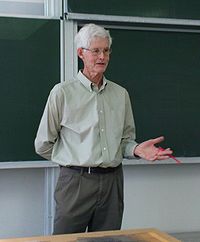Stephen Cook
| Stephen Arthur Cook | |
|---|---|
 |
|
| Born |
December 14, 1939 Buffalo, New York |
| Fields | Computer Science |
| Institutions |
University of Toronto University of California, Berkeley |
| Alma mater |
Harvard University University of Michigan |
| Thesis | On the Minimum Computation Time of Functions (1966) |
| Doctoral advisor | Hao Wang |
| Doctoral students |
Paul Beame Mark Braverman Valentine Kabanets Toniann Pitassi Robert A. Reckhow Walter Savitch |
| Known for |
NP-completeness Propositional proof complexity Cook-Levin theorem |
| Notable awards |
Turing Award (1982) CRM-Fields-PIMS prize (1999) John L. Synge Award (2006) Bernard Bolzano Medal Gerhard Herzberg Canada Gold Medal for Science and Engineering (2012) Officer of Order of Canada (2015) BBVA Foundation Frontiers of Knowledge Award (2015) |
Stephen Arthur Cook, OC OOnt (born December 14, 1939) is an American-Canadian computer scientist and mathematician who has made major contributions to the fields of complexity theory and proof complexity. He is currently a university professor at the University of Toronto, Department of Computer Science and Department of Mathematics.
Cook received his Bachelor's degree in 1961 from the University of Michigan, and his Master's degree and Ph.D. from Harvard University, respectively in 1962 and 1966. He joined the University of California, Berkeley, mathematics department in 1966 as an assistant professor, and stayed there until 1970 when he was denied reappointment. In a speech celebrating the 30th anniversary of the Berkeley EECS department, fellow Turing Award winner and Berkeley professor Richard Karp said that, "It is to our everlasting shame that we were unable to persuade the math department to give him tenure." Cook joined the faculty of University of Toronto, Computer Science and Mathematics Departments in 1970 as an associate professor, where he was promoted to professor in 1975 and Distinguished Professor in 1985.
Stephen Cook is considered one of the forefathers of computational complexity theory.
...
Wikipedia
